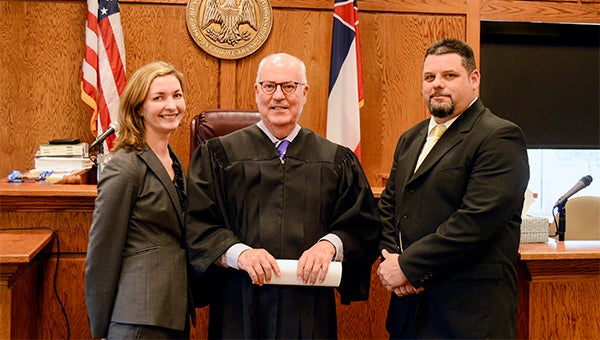Drug court seeks rehabilitation, not retention
Published 7:00 am Tuesday, February 28, 2017

- From left to right, Court Administrator Laurel Brinkley, 15th District Circuit Court Judge Prentiss Harrell and Chris Brumfield, field officer for the 15th Judicial District Drug Court. Photo by Julia Arenstam
In an attempt to stop the revolving door of drug felonies, the 15th Judicial District Drug Court is providing a way for first-time felony offenders to kick their drug abuse habits.
Fifteenth Judicial District Circuit Judge Prentiss Harrell said he’s worked closely with the program in Pearl River County since he took the bench in 2007.
“Mississippi does an excellent job of picking people up,” for drug crimes, Harrell said, but stopping the revolving door of drug crimes takes more than putting people in jail.
The program accepts non-violent, first-time offenders who pleaded guilty to a felony, Chris Brumfield, field officer for the 15th Judicial District Drug Court, said.
After filling out an application that includes the history of their legal troubles, substance abuse, medical care, education, employment and family background, the participants are enrolled in a three-year, non-adjudicated program, Brumfield said.
Each case is individually tailored to the needs of the participant, offering both inpatient and outpatient treatment for drug and alcohol addiction, he said.
At least 75 percent of the program’s participants have gone on to become productive members of society, Harrell said.
With the help of federal grant funding, he said he hopes soon to be able to provide more mental health programs, including hiring a full-time psychiatrist.
“I’m enthusiastic about this program because I’ve seen it change lives,” Harrell said.
The structure and the discipline of the program are what make it so successful, he said, emphasizing the three-year commitment to the program, rather than a six-month private rehabilitation.
“It puts a hammer over their heads,” Harrell said.
Participants in the program can be put in jail for the weekend if they violate the conditions of the program, he said.
Field officers and case managers like Brumfield are tough, yet compassionate, and that’s what it takes for the program to be successful, Harrell said.
Because the program is non-adjudicated, if participant graduates from drug court, the felony is expunged from their record. That means the graduate will retain the privilege to vote and purchase a firearm, among other rights, Harrell said.
To highlight that fact, Harrell has all participants write a three-page paper detailing what would happen if they had been convicted of a felony.
“For many people, it’s eye opening,” he said.
Some of them also say graduating from the program is harder than graduating from college, Harrell said.
He said the program is funded through fines and fees from the participants and as such doesn’t require additional funding from the state or county.
The $75 monthly fee covers the eight monthly random drug tests and other supplies, Brumfield said.
For more information, visit https://courts.ms.gov/trialcourts/drugcourt/drugcourts_questionsanswers.html or go to the 15th Judicial Drug Court Facebook page.





